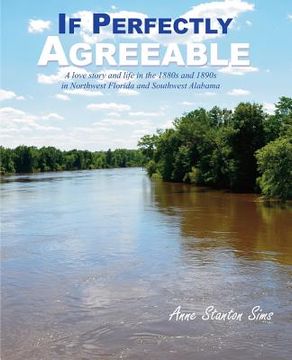If Perfectly Agreeable: A love story and life in the 1880s and 1890s in Northwest Florida and Southwest Alabama (en Inglés)
Reseña del libro "If Perfectly Agreeable: A love story and life in the 1880s and 1890s in Northwest Florida and Southwest Alabama (en Inglés)"
"If Perfectly Agreeable" is the never-before seen look into the lives of a young Florida panhandle couple, their families and the entire region during the late 1880s and early 1890s, as described in the hundreds of letters the couple wrote to each other prior to their marriage in the summer of 1895. Miss Frances Rebecca "Fannie" McDavid lived in the Coon Hill community in Santa Rosa, County, Fla. Joseph Parmer "Joe" Harrison lived across the Escambia River in Escambia County, Fla. in the bustling timber community of McDavid where he was employed by Mr. Milner at the sawmill. Communication and travel during that time in history was challenging to say the least. Even though the couple was only a few miles apart, it might as well have been a hundred miles with the Escambia River dividing them. Mail was the way this couple had to communicate, with nothing instantaneous as it is today. Plans had to be made ahead of time in order to make sure Miss Fannie was at home on the date and time Joe would arrive. And then there was the river! Residents of Coon Hill and McDavid were connected by a ferry that crossed the Escambia River. Their letters constantly refer to the state of the river. Was it too big for the ferry to cross? If Joe got across the river, would it be too big later that day for him to get back? It could be weeks upon weeks when the river was up so high no one was able to get across. Any travel further than across the river by ferry was done by train or on occasion by "private conveyance". In one letter Fannie talks about her trip to Williams (present-day Atmore, Ala.). After crossing the river by ferry, she boarded a train in McDavid, Fla. and went to Flomaton, Ala. to change trains, where she had a five-hour layover because the train from Montgomery was late. Today it's a short 15-minute drive from McDavid to Flomaton and another 15 minutes from Flomaton to Atmore. One of the customs of the day was to have "correspondents." With no telephone, TV, radio or Internet the only way to find out about the goings on of friends or family was to write to them. Fannie had several gentlemen "correspondents" who kept her up on the latest news from their hometowns. Joe began as one of those correspondents in 1891 and continued until they married June 26, 1895. She also had her "Clarke County beau," her Brewton correspondent, the Dr., the Prof., the little preacher and of course there was Leonard McGowin, who Joe seemed to consider his most serious rival for Fannie's affections. Fannie also received lengthy letters from a cousin in Quincey, Fla., Duncan McMillan, which are also included. Joe, too, had his female correspondents besides Fannie - Miss Mat, Miss Mary, his Mobile girl and his Greenville girl. These letters are an amazing look into the customs of the day, when young women worked at home with their mothers and would take frequent week-long trips to visit friends and relatives. Then there were the campmeetings. Oh! My! This was a wonderful time for the whole family. These week-long church functions were more than a revival. It was a time for people from all across the region to gather in a social gala of sorts. They stayed in tents, because as Fannie commented, it was more like being at home than staying in one of the cottages. As you read through this magnificent collection of letters, you will begin to feel as if you are a part of their lives. You will feel the relationship between Fannie and Joe growing with each letter. You will anticipate how Fannie will answer Joe's previous letter, and how Joe will respond to Fannie's comments. You will learn about their families, friends, churches, their likes, their dislikes, the weather, the river, the parties; about births, deaths and sickness. This collection of letters could have been lost if not for the descendants of Fannie and Joe holding onto them for more than a century and allowing them to all be gathered together in order to tell the story of "If Perfectly Agreeabl

